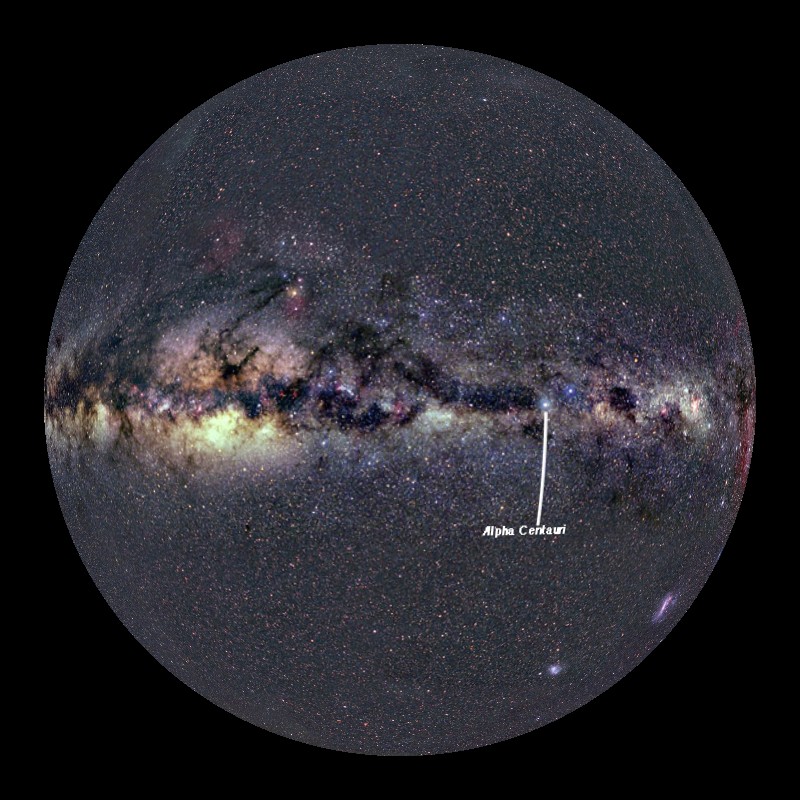Milky Way All-Sky Maps
Description:
The Milky Way Galaxy is home to the solar system and at least 200 billion other stars and their accompanying planets. Some estimate that the Milky Way contains upwards of 400 billion stars. Also included in the Milky Way are thousands of clusters and nebulae. All of the objects in the Milky Way rotate around the Galactic Center, which is the common center of mass of the galaxy. This image of the Milky Way was created by combining 16 wide-angle photographs taken with a standard 35-mm camera and color negative film. This is a visible image of what the Milky Way looks like. Because of interstellar dust, only stars within a few thousand light-years of the sun are visible. These are considered to be "close" stars in the scale of the Milky Way. The stars are visibly different in color, mass, size and luminosity.
There are several adaptations of the same All-Sky Map. The first is simply the image of the All-Sky map that was created by combining the 16 images. The other datasets use this as a base map. The second dataset is exactly the same except for the fact that the location of Alpha Centauri is labeled on the map. Alpha Centauri is a location of interest because it is the closet stellar system to the sun. Alpha Centauri is made up of three stars, the closest of which is only 4.22 light-years away. It is also an interesting place because it is considered one of the relatively few locations in the Milky Way that may offer conditions that are favorable to terrestrial life. On the scale of this image, Alpha Centauri can be used to pinpoint the location of the solar system since they are so close to one another. The third dataset has constellation outlines over the All-Sky map to help the viewer pick out the location of common constellations. The red line is the plane of the ecliptic.
Notable Features:
- 200 - 400 billion stars in the Milky Way
- Alpha Centauri is the closest stellar system to the solar system
- The red line of the constellation map is the celestial equator
Data Category
Major: Astronomy
Keywords:
Astronomy, Milky Way, galaxy, stars, constellation
| Data Set Name | All Sky Panorama |
| Data Set Directory Name | milky_way/all_sky |
| Data Set Source | Axel Mellinger |
| Data Set Developer | NASA Goddard Space Flight Center |
| Visualization Developer | NASA Goddard Space Flight Center |
| Audio | No |
| Contact | NASA Goddard Space Flight Center |
| Download | FTP |
| Data Set Name | Alpha Centauri on the All Sky Map, Where we live! |
| Data Set Directory Name | milky_way/alpha_centauri |
| Data Set Source | Axel Mellinger |
| Data Set Developer | NASA Goddard Space Flight Center |
| Visualization Developer | NASA Goddard Space Flight Center |
| Audio | No |
| Contact | NASA Goddard Space Flight Center |
| Download | FTP |
| Data Set Name | All Sky Panorama with Constellations |
| Data Set Directory Name | milky_way/constellations |
| Data Set Source | Axel Mellinger |
| Data Set Developer | NASA Goddard Space Flight Center |
| Visualization Developer | NASA Goddard Space Flight Center |
| Audio | No |
| Contact | NASA Goddard Space Flight Center |
| Download | FTP |


 All Sky Panorama with Constellations (10 mb)
All Sky Panorama with Constellations (10 mb) Alpha Centauri on the All Sky Map, Where we live! (11 mb)
Alpha Centauri on the All Sky Map, Where we live! (11 mb)